STDF Cameroon project on Penja pepper concludes
- 28/10/2022
- Posted by: Gaetan Dermien
- Category: Cameroon, News

Penja pepper has been grown in the volcanic soil of the Penja valley in the Njombé-Penja region, Cameroon, for about 50 years. It is considered one of the best peppers in the world, thanks to the unique taste created by the local volcanic soil. Cultivation of the crop is a major source of rural employment; almost all Penja pepper is produced by smallholders with less than 3 hectares of land. However, production of the pepper has faced sanitary and phytosanitary challenges that have limited its commercial development.
Penja pepper is the first protected geographical indication from sub-Saharan Africa. Since 2019, COLEACP has been the implementing partner for the project ‘Improving SPS capacity in the Penja pepper value chain (STDF/PG/593)’, which concluded on 14 October 2022. The project was supported by a grant from the Standards and Trade Development Fund (STDF).
The project aimed to ensure that Penja pepper is produced and processed under optimal SPS conditions, by bringing the current specifications into line with international SPS regulations, adopting good agricultural, hygiene, manufacturing and phytosanitary practices. Specifically, this included:
- Identifying sanitary and phytosanitary risks at the production, harvesting and packaging stages
- Defining good production practices (including post-harvest)
- Capacity building for the various actors in the sector to allow them to master the practices.
Raising awareness among key players in the sector was also key to ensuring a quality product that will have long-term access to the most demanding markets.
Major achievements of the project have included, in 2021, the publication of a “Sanitary and Phytosanitary Good Practice Guide for the Penja Pepper Sector”. Various brochures were also produced, in both French and English, targeting the different actors in the value chain. And, over the course of the project, several hundred actors (including nursery workers, producers and distributors) received training in areas such as production and packaging practices and the safe use of pesticides.
This activity is organised within the framework of the project ‘Improving SPS Capacity in the Penja Pepper Value Chain’, supported by the Standards and Trade Development Facility (STDF) and implemented by COLEACP.
